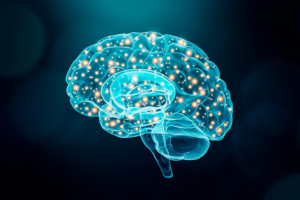
In chronic disease we talk a lot about inflammation. A prolonged state of inflammation, which is observed in chronic illnesses, leads to increased cellular damage and oxidative stress. Sometimes we forget this damage can extend to all parts of the body, including our brains.
Under healthy circumstances, inflammation is a good thing, responsible for clearing out infections and injury, and eventually subsiding to allow for the process of healing and repair to begin. The presence of chronic, low-grade inflammation is where science draws the line and inflammation stops being beneficial.
The brain has ways of protecting itself from inflammation that occurs in other parts of the body, primarily the blood-brain barrier. When the barrier becomes less effective and inflammation in the brain increases it can lead to brain fog, slowed mental speed, poor mental focus, and promotes increased inflammation throughout the body.
Unfortunately, many factors commonly present in the setting of chronic kidney disease (CKD) and end-stage renal disease (ESRD) lead to a break down in the barrier, sometimes referred to as a leaky blood-brain barrier. These factors include:
- Chronic stress
- Uncontrolled blood sugar and diabetes
- Elevated homocysteine levels
- Systemic inflammation
- Poor diet and insufficient supply of antioxidants
When brain inflammation occurs, it makes it harder for a person to maintain an optimal level of cognitive function meaning concentration, learning, and quality of life will suffer. Brain inflammation has also been associated with the development of depression and long-term leads to neuronal death and development of degenerative brain disorders.
So, the question becomes, how do we combat inflammation and support better brain health? Luckily for renal dietitians, there’s a lot of overlap between a healthy renal diet and recommendations to support better brain health. Recommendations include:
- Reduce refined and processed foods.
- These foods, whether they contain refined carbohydrates, high amounts of fat, or other ingredients like high sodium and phosphate additives, promote inflammation. Refined carbohydrates also contribute to poor glucose control. Reducing these foods goes a long way to boosting brain health.
- Enjoy foods naturally rich in antioxidants and fiber.
- Vegetables, fruits, and whole grains have shown to reduce inflammation by increasing antioxidant availability and improving gut health. While whole grains appear to be high in phosphate, it’s much less bioavailable compared to meats and phosphate additives. This means in most cases these foods can be incorporated as part of a balanced renal diet.
- Maintain healthy protein levels.
- Albumin is one of the body’s most valuable antioxidants. By ensuring adequate protein intake, which is a hallmark of the renal diet, albumin can be synthesized and continue to perform its vital functions.
- For people living with ESRD, maintaining protein levels can be a challenge. Providing oral nutrition supplements (ONS), or IDPN for hemodialysis and IPN for peritoneal dialysis who meet criteria can help increase and maintain healthy protein levels.
To learn more about brain health and renal nutrition check out these resources:
- Brain Health from the National Institute on Aging
- PCA RD Portal
- Find new resources for clinicians and patients
